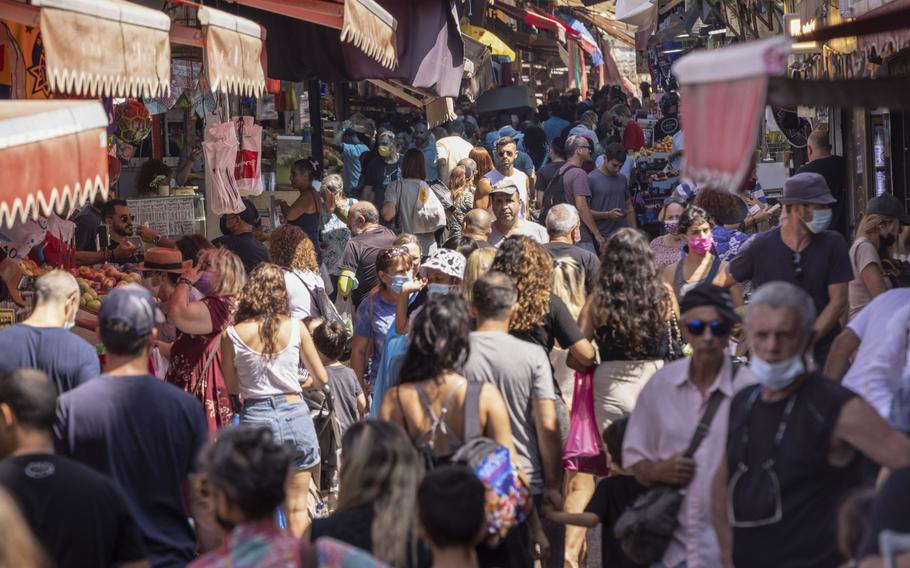
Crowds of shoppers in Carmel Market in Tel Aviv in 2021. (Kobi Wolf/Bloomberg)
Israel must do more to break down vaccine resistance and implement tougher safeguards as foreign tourists start returning next month, or risk a fifth COVID-19 wave, public health experts are warning.
The increasingly urgent calls will be closely monitored worldwide as Israel has often been ahead of the curve in handling the coronavirus, from sweeping restrictions and vaccine programs to renewed outbreaks as its economy reopened. It's in the vanguard again with the world's first widespread booster program, which dramatically brought down a surge in cases generated by the delta variant, but it's being warned of another critical juncture ahead.
"It is not just about opening or not opening the borders," said Nadav Davidovitch, head of Ben-Gurion University's School of Public Health and a member of the expert panel advising the Israeli government on the coronavirus. "It's about how we open. What we did last time was open and then we were passive and did almost nothing — no enforcement, no good genetic surveillance — and gradually we lost control."
Tourists tentatively are to start returning on Monday, pending final government approval. But guidelines the government has released so far apply only to vaccination and testing requirements.
Epidemiologist Hagai Levine, chairman of the Israeli Association of Public Health Physicians, has urged officials to set up a permanent epidemiological unit at the main airport that will serve as an early warning system for new variants as well as future virus epidemics.
He advised the previous government until January, when he left to protest what he called political overruling of professional decisions.
Israel proved during its fourth wave that vaccine resisters could be coaxed to inoculate, reducing their number by almost half. Driving that in part was the contagiousness of the delta variant, which arrived in Israel in the summer. In mid-June, new daily cases were down to single digits, but by early September they peaked above 11,000.
The booster campaign started tamping down those numbers within a month, without a fourth lockdown. Daily new infections are now fewer than 1,000, but the concern is that another new variant could enter the country's soon-to-be-porous borders.
Entry will be allowed to fully vaccinated people and patients who recovered from COVID within six months of their trip. Tourism is a major source of foreign revenue for Israel, accounting for about 1.5% of economic output in 2019.
"With this policy, we accept the fact that some virus cases will enter Israel, but since we can fight COVID-19 without the need of lockdown, through the use of boosters, then this policy is probably safe enough," said Eyal Leshem, director of Sheba Medical Center's Center for Travel Medicine and Tropical Diseases.
That's where enforcement — and even more vaccinations — will play a critical role, doctors say.
"I'm happy we beat the fourth wave without lockdown" but "I'm concerned we're leaving too many people who aren't vaccinated or who don't have a booster," Eran Segal, a coronavirus statistician and computational biologist from the Weizmann Institute of Science in Rehovot, told the Times of Israel news website.
Davidovitch recommends more intensive campaigns to persuade holdouts, including additional vaccination stations. He advised strengthening contact-tracing lab capacity now, while the caseload is lower.
Following the U.S.'s lead, the government is discussing vaccinating children age 5 to 11, with Health Ministry Director-General Nachman Ash predicting that inoculations will begin next month.
The government is also weighing mandatory vaccination under extreme conditions, such as the spread of an especially lethal variant, public health chief Sharon Alroy-Preis told 103 radio.
She's worried about the return of tourists — especially since numbers are spiking in countries such as the U.K. and Ukraine. Some of that increase is due to vaccine hesitancy and waning immunity. But it may also indicate the emergence of a variant that doesn't respond as well to existing vaccines, she said.
"The vaccine has brought down the infection rate, but the vaccine alone can't do all the work," she said.